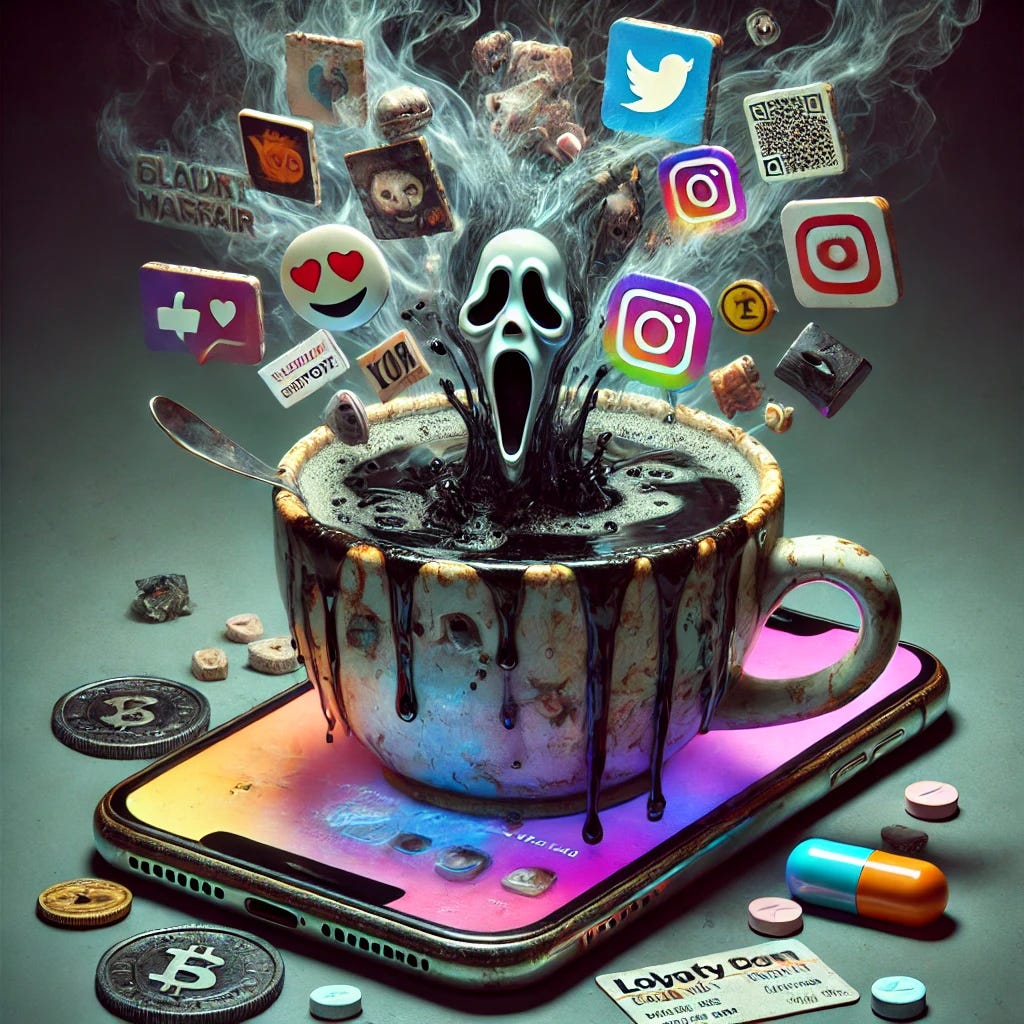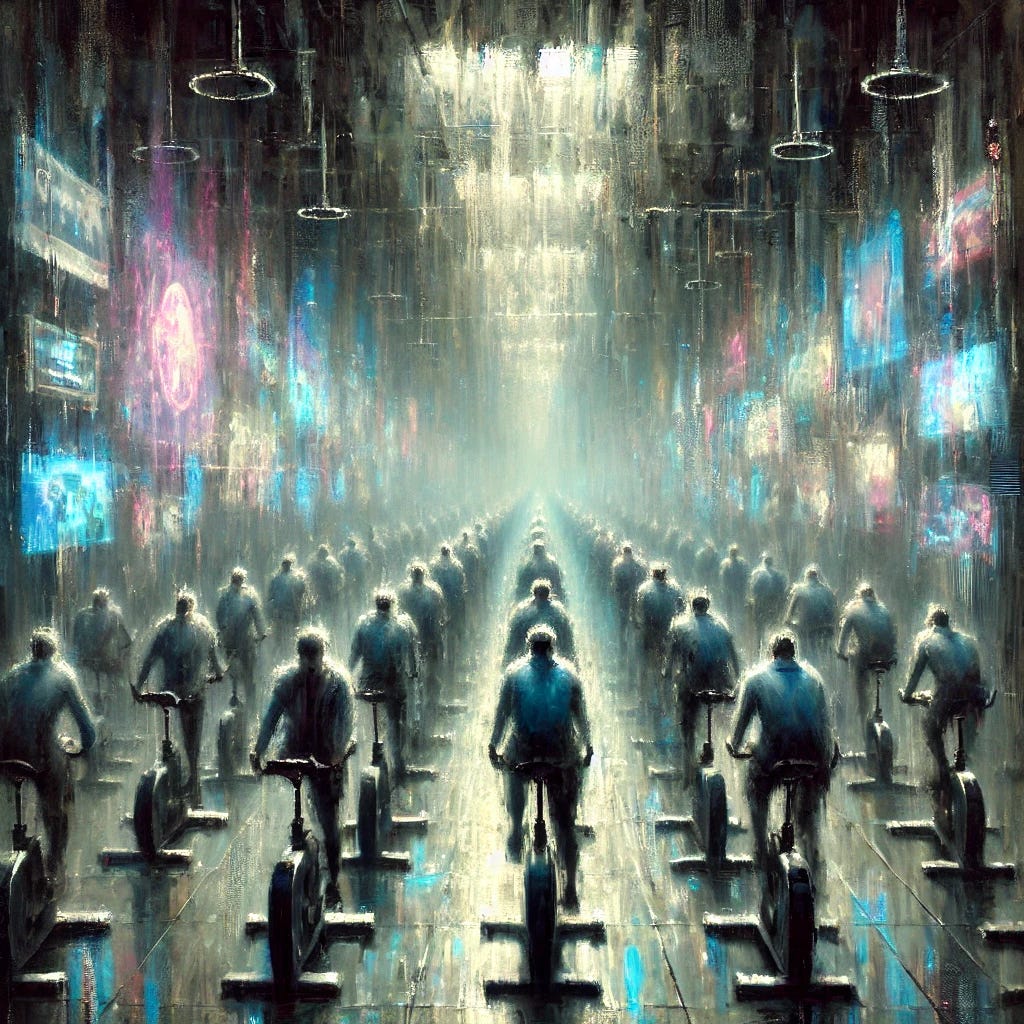The Sad Gospel of Black Mirror: A Cynical Lens on Gen Z’s Digital Bleakness and Consumerist Slavery
Gen X worships at the same church, just has spottier attendance
If you believe in the importance of free speech, subscribe to support uncensored, fearless writing—the more people who pay, the more time I can devote to this. Free speech matters. I am a university professor suspended because of a free speech issue, so I am not speaking from the bleachers. The button below takes you to that story.
Please subscribe to receive at least three pieces /essays per week with open comments. It’s $6 per month, less than USD 4. Everyone says, "Hey, it’s just a cup of coffee," but please choose my coffee when you come to the Substack counter. Cheers.
In the flickering signage of our digital age, Black Mirror1 gives us a cheeky, blasphemous scripture, a gospel scrawled in code for a generation suckled on screens and shackled to despair.
Charlie Brooker’s anthology series doesn’t merely gaze at itself in all of its dystopian ugliness—it shatters the glass, forcing us to crawl through the shards. Its themes of technological tyranny, eroded agency, and existential dread resonate with Gen Z’s bone-deep awareness of their chains, forged not just by algorithms but by the insatiable god of consumerism.
Black Mirror excoriates our digital delusions and willing servitude to consumption, nowhere more brutally than in “Fifteen Million Merits.” This episode, a grim parable of commodified existence, exposes a truth as merciless as it is undeniable: we are knowing slaves to consumerism, and our dystopia is one we’ve bought on credit.
Black Mirror is a dirge for human autonomy, like Sam Harris singing to the hum of server farms, not a happy drunk, but not angry, with sadness only showing when he forgets the chorus.
Episodes like “Nosedive” and “White Christmas” depict worlds where technology enslaves, turning social approval into currency and consciousness into a cage. Yet “Fifteen Million Merits” sharpens this critique, revealing how consumerism fuels the machine. In this episode, humanity pedals stationary bikes to power a sterile world, earning “merits” to spend on digital trinkets, porn, or a fleeting chance at fame.
It’s a soulless life reduced to transactions, where every calorie burned feeds the system. Gen Z lives in this reality, drowning in microtransactions and influencer hauls. They want to be the influencer but it sits on envy, not admiration.
Raised on Amazon wishlists and TikTok’s “get ready with me” capitalism, they navigate a world where identity is a brand, and freedom is a subscription plan. Brooker’s cynicism, bitter, but not spit it out bitter, shows we’re not just complicit—we’re pedalling the bikes, grinning as we sweat.
This consumerist dystopia breeds a paradox: a generation both cynical and awake but not always woke.
Gen Z’s worldview, scarred by late-stage capitalism, the despair of our sanctified hobgoblins of climate collapse, and the veneration of cultural self-hatred, aligns with Black Mirror’s unrelenting pessimism.
They’ve seen tech’s promises—connectivity, empowerment—curdle into surveillance and addiction. “Fifteen Million Merits” lays bare the scam: the system dangles escape (a talent show, a golden ticket) while ensuring you stay chained. The episode’s protagonist, Bing, spends his merits to rage against the machine, only to be absorbed by it, pedalling in a fancier cage.
Gen Z gets this. They’ve watched influencers sell “authenticity” while shilling skincare and seen X posts about “financial freedom” peddling crypto scams. Their red pill awareness knows the game is rigged. Black Mirror validates this, offering not hope but a grim nod: you’re right to distrust, because the system is a slot machine, and you’re the coinage.
One could salivate over Black Mirror’s contempt for false gods, especially the deity of consumerism. “Fifteen Million Merits” eviscerates the myth that buying equals being. It’s a world, plastered with ads you can’t skip unless you pay, mirrors our own—Gen Z can’t open X without a sponsored post or close YouTube without a pre-roll.
The episode’s satire is Hitchens-level savage: every choice is a purchase, every dream a product. Silicon Valley’s gospel—disruption, “changing the world”—is unmasked as a sales pitch. Brooker, and Generation Z, sees through the dogma.





